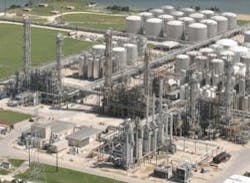Texas manufacturing plant reduces pump failures and equipment downtime
Johann Haltermann is a custom processing manufacturing plant located in Houston, Texas, and is a division of the four family-owned Monument Chemical Plants in operation in the United States and in Europe. Monument Chemical offers a line of specialty products and solvents, custom manufacturing services, and, through Haltermann Solution, specialty fuels. Monument Chemical manufacturing plants are located in Antwerp, Belgium; Brandenburg, Kentucky; Houston and Baytown, Texas. The Antwerp and Brandenburg plants operate as Monument Chemical. The Houston and Baytown plants operate as Johann Haltermann and Advanced Aromatics, respectively. All facilities have long histories of distillation and reaction chemistry and have easy access via water, road, and rail.
Preventive maintenance plan
In 2012, custom processing manufacturing plant Johann Haltermann set out to implement an aggressive plan to reduce equipment failures by 25% in order to meet production requirements. Rick Caines, Adam Pingel, and I led a program driven by the need to fulfill increased customer orders during a period of business growth. The plant historically had opportunities for improvements on the rotating equipment side from the nature of the operating conditions and the demanding load applied to the equipment. The Haltermann team began the process by looking for a preventive maintenance program that would address how equipment already in place could be improved with regard to reliability.
The first point of focus of the preventive program was from the lubrication standpoint. Based on experience, a pump seal only lasts as long as a bearing lasts and a bearing lasts as long as the oil’s ability to maintain its proper lubrication properties. The team researched several different oil manufacturers and selected high-performance synthetic-lubrication manufacturer to provide a presentation on the benefits of using its products.
A Falex test was done, using the ISO 68 oil we were currently running through most of our pumps. The test showed that Royal Purple’s Synfilm 68 film strength exceeded the lubrication qualities of the ISO 68 that Haltermann was utilizing. I was impressed by the film strength of the Synfilm 68 and its ability to maintain lubrication under extreme bearing load without any metal loss and still produce a 50% reduction in power consumption.
The investment
Mid-2012, we started the transition to Royal Purple by changing more than 500 pumps to Synfilm 68 in the ANSI and API pump bearing oils, and then we complemented this with the use of Royal Purple’s FDA 34 Barrier Fluid to satisfy pharmaceutical requirements and to improve on mechanical seal lubrication. Eventually all of the equipment was changed over to Royal Purple lubricants, including Synfilm 32 in the high-speed gearboxes, Synfilm 150 in the cooling tower right angle drives, Synfilm GT 220 in the roots blowers, Acivac 100 in the dry vacuum pump systems, and Max-Tuff for assembly processes.
Education
The next step in our preventive maintenance and reliability program was education enrichment for employees in operations and maintenance. We utilized the oil manufacturer’s Extended Services Classes, provided by Reliability Manager Bob Matthews, with whom I worked to develop a course curriculum that specifically fit the needs of the Haltermann plant technicians.
As a result of the classes, technicians learned how to maintain, repair, and operate equipment properly while increasing their awareness habits and improving the day-to-day quality level. Millwrights also improved their quality performance, and the training directly triggered a change to improve the environment in which the repairs were made with the addition of a clean room to improve the level of cleanliness to help to facilitate a higher level of repair.
Operations personnel undergo an eight-hour operator-awareness class to support the drive for improved reliability through a joint effort within maintenance and operations.
The results
Prior to 2011, the plant historically had more than 175 pump-related equipment failures annually. In 2012, the equipment failures took a significant change in the right direction. The 2012 total dropped to 156 pump failures and a loss of 464 hours of production, and the 2013 failures were below 100 with an adjusted loss of 268 hours of production, a significant improvement over 2012. These impressive results add up to a 42% reduction of downtime in one year, and a cost avoidance of more than $460,000. The MTBF for 2012 was in the 28-month range and the MTBF for 2013 is 60-month range. All of these improvements happened while producing a 20% increase in production for 2013.


